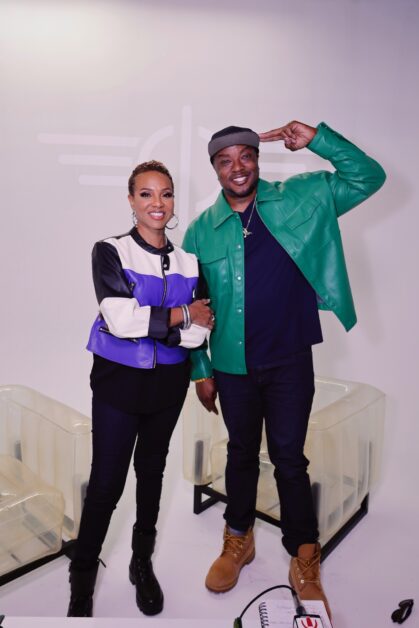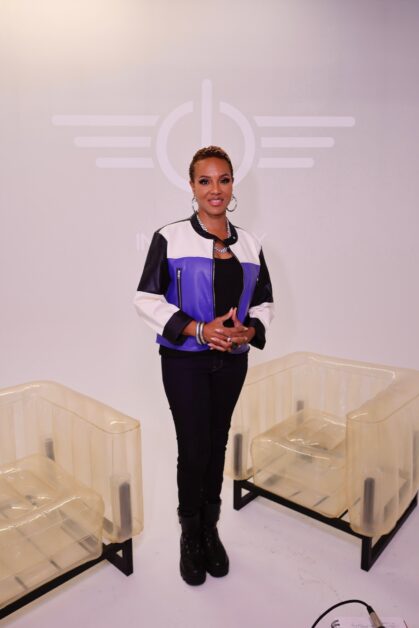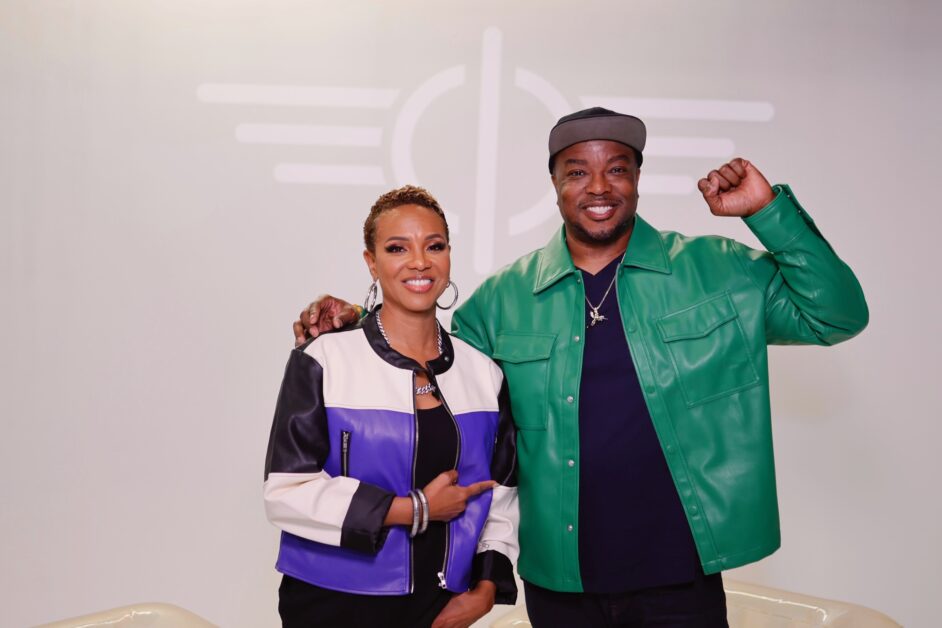Pioneering artist and business woman MC Lyte has been a part of our lives for decades but remains a bit of a mystery. In a recent interview with AllHipHop, the Brooklyn-born queen opened up about her highly anticipated album, One of One, and remarkable journey.
Speaking to Chuck “Jigsaw” Creekmur, who dives deep into MC Lyte’s creative process, she revealed the personal and introspective nature of this project. In a day of truly negative music, her goal is to share “inspiring and aspirational” songs for the culture. Ultimately, after many years of being dormant, she realized she was the only one who could bring this vision to life. Collaborations with artists like Stevie Wonder, Ghostface Killah, Lil Mama and Common and more add depth, bars and punctuate her commitment to artistic authenticity.
MC Lyte talks with candor. Her wisdom, grace and unwavering commitment to her craft shines. She blends personal stories with broader industry insights making the interview a must-read for any Hip-Hop fan. With the release of One of One, MC Lyte once again proves her status as a true icon and a trailblazer. Peer into into the mind and heart of a legend.
AllHipHop: What was your goal with this album? It’s been a long time coming.
MC Lyte: Yes, it’s been a long time—10 years. My goal was to create music that’s inspiring and aspirational. At some point, I realized only I could bring this vision to life. My friend Affion Crockett joined me in the studio and helped with a couple of tracks, including “All Right” and another called “Hire,” which will be on the next release. Eventually, though, I realized the album was becoming very personal and intimate, so I called him and said, “I love you, but I need to finish this on my own.” That’s when songs like “Thank You” and “King” took shape, which I hope listeners find impactful.
AllHipHop: For those who may not know, Affion Crockett is an amazing comedian and a huge Hip-Hop fan.
MC Lyte: He’s an MC in his own right!
AllHipHop: Speaking of collaborations, you worked with Stevie Wonder and Common. That track hasn’t been released as a single yet, but it’s already becoming a fan favorite. Why do you think that is?
MC Lyte: It’s interesting—people make assumptions, saying things like, “Oh, your demographic isn’t on DSPs.” But people don’t really know. Once we accept that, we can let the music speak for itself and let listeners find it naturally. For “Change Your Ways” to be the most-streamed song on DSPs was a surprise. The track was actually created by a producer named Concept from Inland Empire in Los Angeles, and it was his first release.
When I heard the beat, I immediately wanted to work with it. After writing my first verse, I thought of Common. Thankfully, he agreed and gave me an amazing verse. Stevie Wonder was the final touch. Our executive producer, Warryn Campbell, is one of his musical directors, so he helped connect us. Stevie and I have been friends, and he often calls me to share stories, which I love. Having him and his harmonica on the track was such a blessing.
AllHipHop: Thinking back on your journey, I wanted to ask—how has your experience been as a woman in Hip-Hop? The industry has changed a lot, and it’s been especially tough for women. You had three bodyguards at one point—that’s intense.
MC Lyte: Yeah, there was a lot going on. Not all three were with me all the time. Two of them, these young dancers from Alaska, were part of the team, and we had security to keep them safe too. It was wild back then, and we needed that support.
As a female MC, it’s a tricky question. I don’t want to say it was easy, but my team worked so hard around me that I didn’t feel the full weight of the challenges. My manager, Nat Robinson, our security, and my label really looked out for me as a young artist. I probably got away with things others couldn’t.
Well, I dressed the way that I wanted. I said whatever I wanted. I showed up no makeup. I just showed up as a kid from a Brooklyn block. And there was no scolding about it. I just was free.
AllHipHop: Did you realize you were making history when you dropped Lyte as a Rock?
MC Lyte: Maybe the management, Audio Two, the producers, and King of Chill did, but I didn’t. I was just there, having a great time and living out a dream.
EXCLUSIVE: MC Lyte Talks New TV Show & Her Future In Hollywood
AllHipHop: Who inspired you? Besides Salt-N-Pepa, were there others?
MC Lyte: Definitely. I listened to Sweet Tee, Sparky D, Roxanne Shante, Finesse & Synquis—all the female MCs. I wanted to see who was bringing what style.
AllHipHop: How did it feel when you had to go up against Roxanne?
MC Lyte: It didn’t feel good because it wasn’t really about her. It was driven by Grand Daddy I.U. or maybe his label (Cold Chillin’ Records). But I went to her ice cream shop in Queens, and we hugged and made peace. Since then, it’s been real. As you grow in this game, if you let it teach you, you gain wisdom. Conversations with Shante now are all about learning, and it’s great to be an OG but even better when you can learn from those who came before you.
AllHipHop: Yeah. I think about Self-Destruction all the time and how we took the reins to really try to control our destiny. Sometimes, I feel like we’re not in control now. I should ask—what are your thoughts on the evolution of hip-hop? There’s a lot to be said, both positive and negative. You mentioned the positive, but I do have concerns, especially with so many folks dying from drug overdoses, and just about everything you can name. Is that more an indictment of the culture—American culture—or is that something within our own subculture?
MC Lyte: You know what, I always say that art imitates life. So, the things we’re seeing that seem so hyper-sensationalized, if I can put those two together, are because there’s such a magnifying glass on hip-hop. But hip-hop is a reflection of what’s happening in the community. And then the community watches hip-hop, and it becomes magnified even more. So, unfortunately, yes, the drugs get glamorized. I recently saw Nicki do an interview where she said Future doesn’t even do drugs, and I was like, “Is this for real?” In my day, you didn’t fake doing drugs because drugs weren’t cool. So, in any case, I think people now are putting in hip-hop what they think people want to hear.
AllHipHop: Honestly, 50 didn’t drink or smoke either. So, he had us fooled for a minute.
MC Lyte: Right? Yeah, it’s really interesting. But then, in the end, they do.
AllHipHop: Now he does. I saw him once with at least maybe a little champagne.
MC Lyte: My style of presentation to hip-hop is—I don’t care what you really like to hear. I’m going to give this to you, and hopefully, you’ll like it, but I’m staying true to who I am now. And, of course, it took time for me to develop into that person. I call this record my ministry because I’m speaking truth to power, whether you like it or not. Hopefully, if I can catch you at the right time, I might be able to lead you somewhere different from where you’re being led to right now.
AllHipHop: Yeah, because your album One of One almost has—obviously, working with Warryn probably helps—but it sounds very gospel, like gospel hip-hop. It definitely starts out almost like a gospel record, and then you start, like you said, talking about different topics, pretty heavy subject matter as well. But that’s an evolution, right?
MC Lyte: Yeah, definitely. With “Thank You,” “Woman,” “King King”—very purposeful records. And it’s not until you get into the album, you’re like, “Oh, okay. She’s talking about that.” And that was one of the things A&R and I talked about. He was like, “Well, you don’t want to sound too preachy.” And I was like, “I’m not calling you back to the studio.” No. I was like, “Oh, okay.” Now, I’ve got to approach it like we’re having fun. I’m telling you who I am, but look at what I’ve learned in the midst of this. I mean, for somebody to get on record and say, “I was in the Devil’s Den,” and now I’m out, and I can speak the truth. I can tell you what it’s like in there, and if you give yourself over to God, you can make your way into the light—no pun intended.
Photos by Patrick Neree





